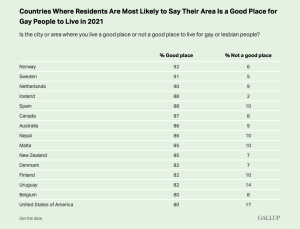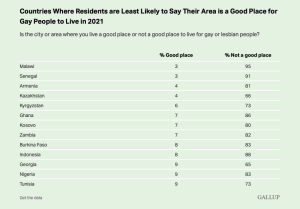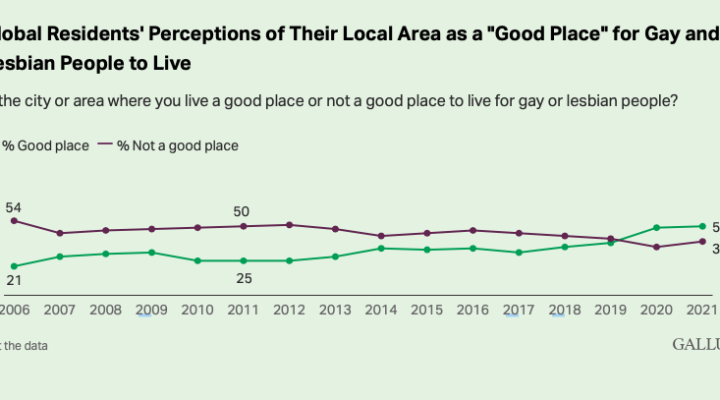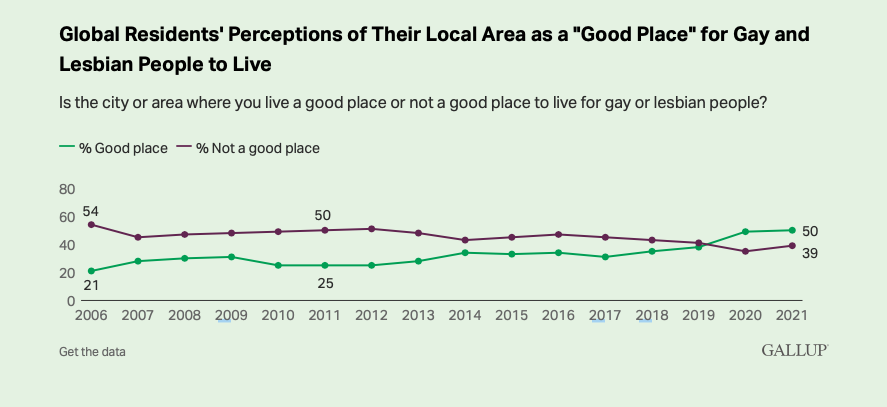The world is getting better for gays and lesbians, according to a new Gallup World Poll survey.
Last year, 50% of adults worldwide indicated their community is a “good place” for LGBTQ people to live, Gallup announced. That percentage doubles the same answer provided to the question 10 years ago.
“The latest figure, based on surveys in 110 countries and areas in 2021, reaffirms several other global studies that show acceptance appears to be growing across the world,” Gallup said. “But the data also reveal a significant remaining divide. About four in 10 people worldwide say their area is ‘not a good place’ for gay and lesbian people, while 12% do not know.”
 The proportion of adults who say where they live is a good place for LGBTQ people has increased dramatically since Gallup first asked the question in 2005. Back then, only 21% of respondents — one in five people worldwide — answered affirmatively. The good place number ranged from 31% to 38% between 2014 and 2018. Then it jumped to 49% in 2020, Gallup reported.
The proportion of adults who say where they live is a good place for LGBTQ people has increased dramatically since Gallup first asked the question in 2005. Back then, only 21% of respondents — one in five people worldwide — answered affirmatively. The good place number ranged from 31% to 38% between 2014 and 2018. Then it jumped to 49% in 2020, Gallup reported.
The upward trend in acceptance of LGBTQ people is widespread, the latest survey revealed. For example, the good place rating increased by at least five points in 73 countries. And 14 countries switched from previously being ranked as not a good place for gays and lesbians by a majority of respondents to being considered a good place by more than half the latest survey participants.
Some of the largest gains occurred in Asia and Eastern Europe, Gallup reported.
In Nepal, only 23% of respondents said their city or area was a good place for LGBTQ people to live in 2011, but that number soared to 86% in 2021. In India, the shift increased from 12% in 2011 to a majority, 53%, in 2021. Gallup noted court decisions and other legal protections for LGBTQ citizens likely contributed to the changes.
The United States tied Belgium for 14th place among all nations, with 80% of survey participants claiming favorable conditions for LGBTQ people in their cities and areas.
Increases of more than 20 points occurred in Taiwan, where 57% of respondents ranked their communities as good places for gays and lesbians, similar to majorities also in Thailand (54%) and Vietnam (51%).
In Eastern Europe, double-digit positive increases occurred in the Czech Republic (70% good-place ranking), Slovenia (54%) and Poland (52%).
 Conversely, in Nicaragua and Paraguay, which both recorded majorities who gave good place rankings in 2011, double-digit decreases resulted in minorities who last year said they live in good places for gays and lesbians. Gallup pointed to governmental and political opposition to LGBTQ rights as likely factors in the declines.
Conversely, in Nicaragua and Paraguay, which both recorded majorities who gave good place rankings in 2011, double-digit decreases resulted in minorities who last year said they live in good places for gays and lesbians. Gallup pointed to governmental and political opposition to LGBTQ rights as likely factors in the declines.
Overall, Scandinavia ranked as the most accepting region for LGBTQ residents. Overwhelming majorities of respondents rated their communities as good for gays and lesbians in Norway (92%), Sweden (91%), Iceland (88%), and Denmark and Finland (both 82%).
Several European countries scored similarly, including the Netherlands (90%), Spain (88%), Malta (85%) and Belgium (80%).
The United States tied Belgium for 14th place among all nations, with 80% of survey participants claiming favorable conditions for LGBTQ people in their cities and areas, Gallup said.
On the other end of the spectrum, the polling organization said Africa — where numerous countries outlaw homosexuality — comprises a cluster of countries where fewer than one in 10 people say their communities are good places for gays and lesbians to live. Those countries include Malawi and Senegal (both 3%), Ghana and Zambia (7%) Burkina Faso (8%) and Nigeria (9%). Several formerly Soviet countries scored similarly, including Armenia and Kazakhstan (both 4%), Kyrgyzstan (6%) and Georgia (9%).
Gallup noted it is “unable to ask this question in some countries because of the sensitive nature of the question.” Last year, Gallup decided not to ask the question to respondents in 12 countries.
Related articles:
Uyghur American elected chairman of U.S. Commission on International Religious Freedom


